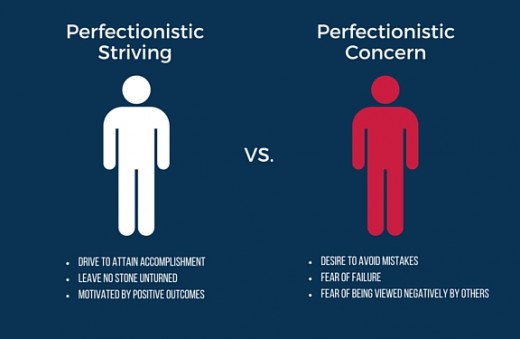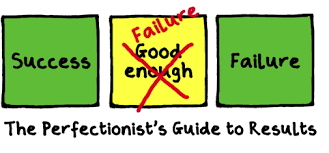The Irresistible Futility of Perfectionism

“Nothing is perfect”. “We’re only human”. “It’s our faults that define us just as prominently as our merits”. All eloquent, congenial statements, professed in the vein of justifying and preserving one of the most horrendously aggrieving, yet veritably accurate elements of the gospel truth of the very eminence of life in the world. It is no revelatory or revolutionary realisation to reach the conclusion that nothing or nobody is perfect. Not only human beings, but all members of the animal kingdom are susceptible to fallacious mistakes or errors, and other facets of nature are inclined to the possibility of imperfection as well. Even synthetic computers, designed for meticulous precision, and crafted to exact the practice of diligent pedantry, occasionally fall prey to shortcomings; They themselves have been constructed by humans, who are debatably characterised by blemishes aplenty.
So, if this is such a pragmatic and rational course of logical cognisance, why on Earth are so many people almost pathologically fixated upon the perfection of(in some cases) even the finest, most trivial pieces of minutia? There are many diagnosable causes for it-Some coherent and consistent, while others are more vague and undetermined. That quandary itself could be a representative analogy of the debate. Many would argue a compelling case that being obsessed with the pristine consummation of any particular pursuit down the many varied avenues of life is simply a facet of human creation. A part of the condition of the species. And that is largely irrefutable as per the verdict of an overall consensus; But is it the entire story?

An equal quantity of postulating purveyors would claim that is not. Matters rarely are ever so simplistic and lucid. To fully encompass the complete dynamic would be exhausting and inconclusive, but it is part of the fascination of the odyssey of traversing the landscape of the trials and tribulations that life presents to truly realise and accept the fact that certain things may never be wholly and unanimously established. It is the spice of life to allow certain elements of curiosity remain mystery, and this has been manifested in many guises. For instance, the phrase “You never know what’s around the corner” is uttered pretty liberally, with reckless abandon. And its prevalence is not unreasonable.
More philosophical or visual portrayals of that ideological construct have taken the form of science fiction escapades where a protagonist endeavours on the narrative of a parabolic thread that enlightens them to either be competent to, or influential upon the eventuations of the future-And the endearment to the resolve of the allegorical progression is usually in the recognised discernment of their naivety in believing that such omniscience would somehow enhance their, or another’s, experience of life. They have become staple tropes, standing as foundational pillars for the fundamental construct of the multitude of books, comic, television series and films they embody. And once again, it is due primarily to the universal palatability of the stories.

Even despite the arguable over-saturation of such tales and principals, there are few symptoms of a fatigue with them-And that is by virtue of the innovative new methods of implementing or implying the constructs(both through subtle undertones, and overt displays), the resonance of the familiarity with them, and the ability to extrapolate the correlative metaphors and apply them to real life. They are metaphors for the very motivating thrust that impels people to rise out of bed in the morning. No matter the outlet, everyone has something that drives their ambition and conviction to accomplish something. It varies from individual to individual(both in intensity and relevant sector of venture), and another dimension to the development of a character is learning to discern where most appropriate to exercise them.
For some, the compulsion to achieve a state of perfection, or as near to it as possible, only exponentially intensifies and grows commensurate to their own personal growth. While others find it possible to take a more relaxed approach to their endeavours. But even those less motivated toward something will experience at least a sporadic intermission of progressive plights in life, as it has already been established as the biological malady that it is. People make indiscriminate unilateral decisions with the only consideration being that of one to cultivate the promise of their personal determination, and it is often as a consequence of “running toward” or “away” from something.

Psychological and mental or emotional priorities and afflictions can factor in significantly, as the more irrational endeavours of life can be predicated upon the internal conflicts with depression or anxiety, and symptoms of those ailments can be both exhibited or alleviated pending the outcome of a particular striving effort. Exceptional examples can consist of the magnificent feats of accomplishment from musical artists, such as Michael Jackson, Steve Tyler of Aerosmith, and virtually all of the members of My Chemical Romance or Slipknot at some juncture or other. Each have conformed to the unjust stereotype of the vulnerability of alums of that industry to narcotic and alcohol abuse, depravity and other ill-advised exploits during the tenure of their careers, and have also subverted it by the circumventing and relinquishing of inner demons.
They have stood as provisions of stellar models of an admirable and an honourable example of inspiration to their fans, and that has come as a result of their own initiative. It is one of, if not, the most prominent reasons for the elevating epitome of adulation and worship they are the recipients of, because of the fact that they have simultaneously confronted their own issues, while manufacturing an image of being a conducive emissary for the conveyance of a message of persevering resilience for their admirers in their toils with adversity. And it all stems from their motivation.

Whatever the basis for it, they have achieved accomplishments akin to one another, and they are ostensibly lauded for the laborious approach they have taken to it. It is exposed by those that have such fame from the pertinent industries, because the intrinsic characteristic traits that are requisite demands of the criterion of the industries are only found within certain individuals. A personal story of a builder and their struggles with life is far less likely to reach the summit of social or societal popularity because of the debatable mundanity of their profession and its often under appreciated salience to the world. But that doesn’t make it any less worthy of a profile to behold.
Environment factors are also important contributors to a mentality. The responses to the interaction with people and things, and the enduring impact in the aftermath are the essential components to the physical practice of the theory. The trauma of an occurrence in life, or the impression lasting after a discussion can inform the revolution of one’s actions, and can even develop into premeditated precautions taken for the purpose of conserving some humility in the rationale for certain decisions. So generalised, but due to the ubiquity of the circumstance.

But how do they apply to actual perfectionism? As already alluded to, the cardinal pertinence it has to the very purpose of motivation is the intense extension of it. It doesn’t apply in absolutely every situation, but, whether an inescapable consequence of an individual’s nature, or impelled through an environmental or developmental incident(both physically and mentally), it is a concern that everyone encounters during the tenure of their lifespan. And while it can be affected by the sustained integrity of the welfare of mental and, or physical health, it can also indirectly influence that. And in turn, can become influenced by it again, to perpetuate an eternal cycle-As is the parallel with the relentlessness of life.
This is where the more pessimistic stance of perspective can be adopted. This is where the futility of the affair can come to the forefront of the perception. Because, for everything that people resiliently and persistently strive for, whether individually or collectively across the course of their lives, failure, defeat and disappointment are inevitable eventuations that threaten to subject any efforts or endeavours to redundancy. For those with methodological or meticulous attention to the detail of their craft, it can spell despair. When participating in earnest discussion, many postulate or even pontificate about the worthiness of the investment when there is an omnipresent risk of a lack of fulfilled consummation.

Athletes that devote their lives to the correct appropriate diet and conditioning training in order to reach the pinnacle of the potential of their performance capacity, only to fall victim to injury at the final hurdle or to have peers disappoint them in team sports, are quintessential examples. It is literally enough to reduce down women and men to tears. Simply stating the possibilities of such fatal instances is a basic, but sufficient conveyance to outline all of the frailties in the systematic structure of the approach to surmounting any task. And it often leads to the aforementioned scepticism and scrutiny. If there is the inherent risk of failure, why bother?
When responding to such apprehensiveness, the specifics vary from person to person, but in many cases the answer is simply because of that very fact-Because there is a risk. Even a perfectionist can appreciate the derived elation and pleasure that comes to fruition when the odds of adversity are triumphed over. Defeating the oppressive tyranny of the torment of setbacks to achieve at least a satisfactory outcome is incomparable to any other extrapolative delight. Even if, on occasion, it comes at the expense of dignity at some point along the way. But when the aspiration is perfection with no exception, the possibility of inadequacy is always more eminent than not. It all boils down to the concept that the higher the standard, the lower the likelihood of fulfilment. That is the most beleaguering peril of any pursuit of ambition.

The purism of pedantic fixation rarely ever reaches consummation, and it is a dire circumstance of inequity that afflicts the world. Nothing can ever be truly perfect, and compromising concessions frequently and reluctantly have to be made. And so the last resort in order to preserve any chance of optimism is to temper the tailor-made expectations to accommodate the philosophy that is purported by many-Beauty[perfection] is in the eye of the beholder. And perfection is subjective to the whims of a person’s particular definition of it. Even the stubbornest perfectionist may be willing to concede to the argument that sometimes, the fallibility of a product is precisely what makes it perfect. Opulence can be adored and lionised in relished resplendence and glory, even if the result is not infallible.
Appreciating the idolised awe that can be incited upon the rationality of an objective standpoint of viewership is an essential component to be considered when desiring gratification. And the eventual reward of reaching that realisation is where perfectionism is at an optimum point of therapeutic ecstasy. Perfect could be defined as the capitalisation upon the refinement of every little intricate detail of a patented blend of decorating the home with enriching furniture with the appealing pervasive aromas to consolidate in an overall delightful domestic atmosphere for someone, conforming to the typical orthodox conventions of what the definition of “perfect” should be. But for another, it could be the casual negligent abandonment of such responsibilities, and the elation of festering in slobbery, as an equally wonderful experience-Subverting and contradicting the conventional expectations of that definition.

The scope of one’s horizons has to be broadened in order to be able to derive any semblance of joy from life, and not vacuously detract from those sporadic moments where an opportunity for irregular joy to be exploited is presented. It is what makes the enterprise of pursuing not only perfectionism, but anything of substance in life worthwhile. It is what makes that ambition so irresistible, despite the hindering disadvantages. Everyone on the planet is only biding their time after all. Is there a futility in the enterprise of perfectionism? The conclusive answer will depend of the definition of the very concept.








